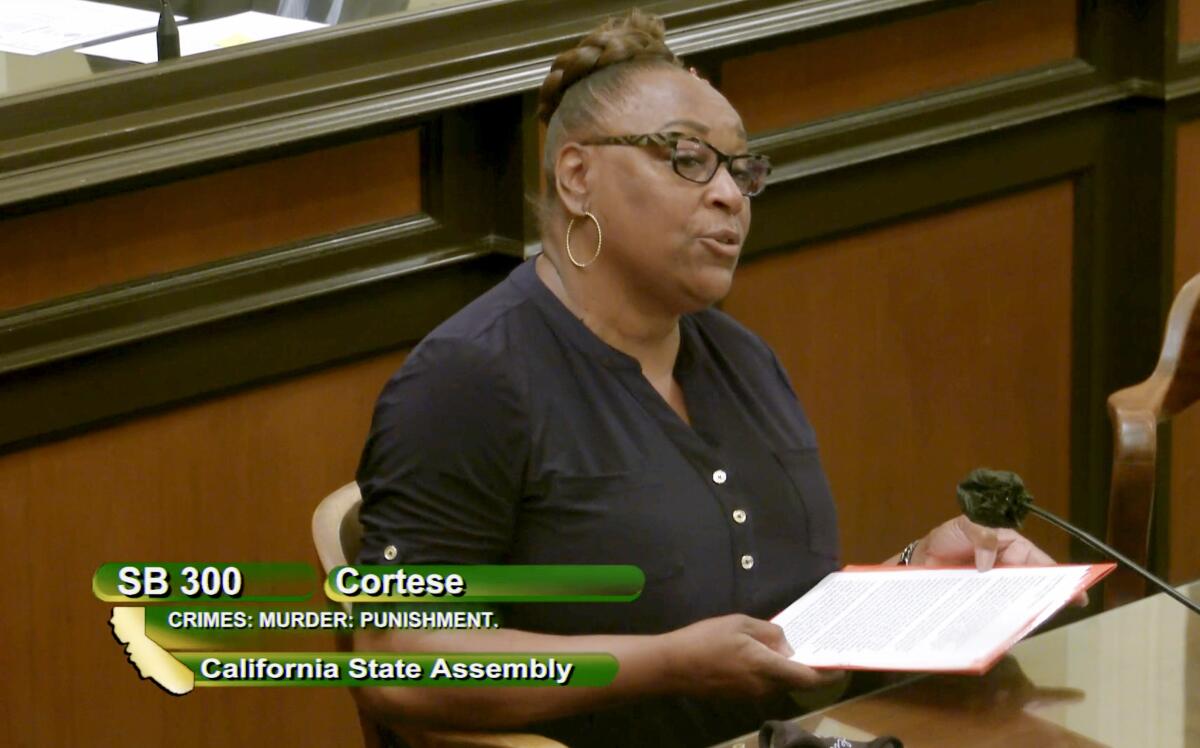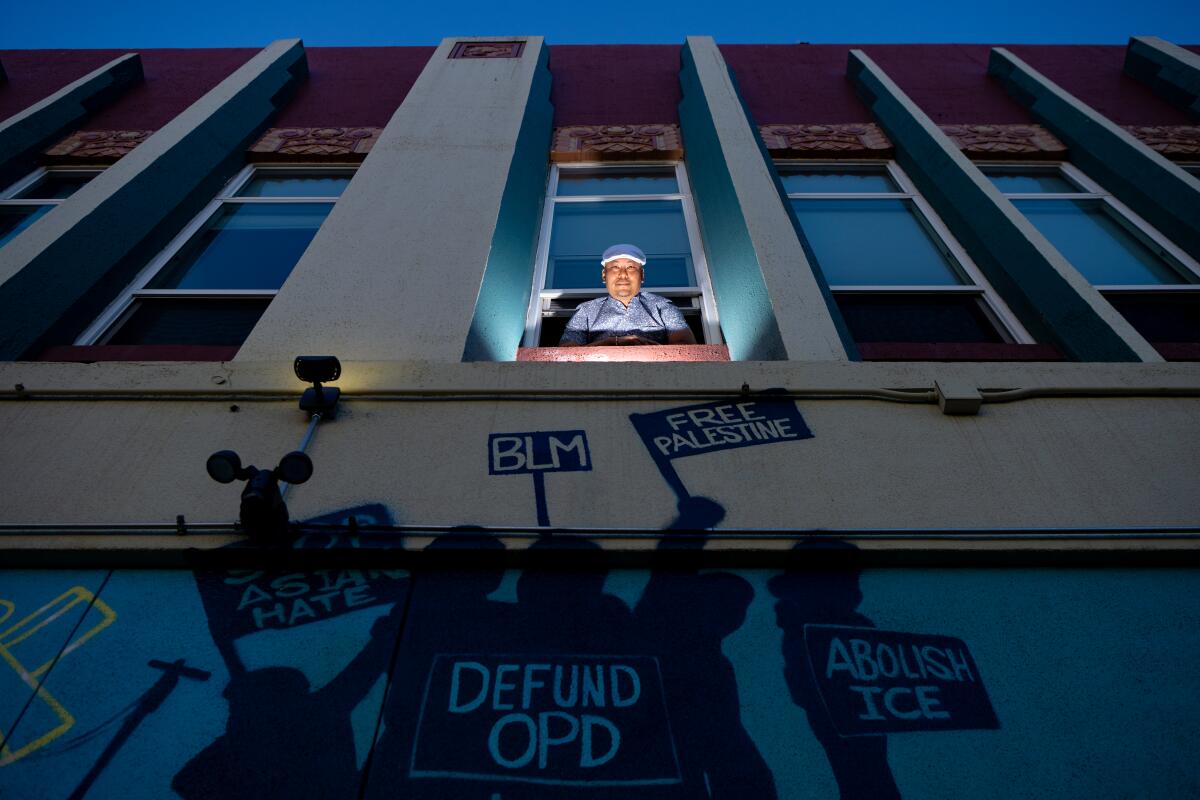This man’s imprisonment shows why California’s ‘special circumstances’ rule must change, reformers say

- Share via
SACRAMENTO — Jamil Wilson was planning to celebrate his 20th birthday with friends, so he didn’t give it much thought when one of them, prior to the party, asked if they could pick up another pal at his home in Cerritos.
What Wilson didn’t know, he said later, is that his two friends were planning to commit a murder that night in 1994. By being at the scene of the crime, he would become an unwitting accomplice.
Wilson and his friends, Adrion McFarlin and Duane Gittens, were later arrested in connection with the murder of Gittens’ mother, Delphina Gittens, according to interviews and court documents. Duane Gittens said he took part in the killing because his mother had abused him for years.
Despite maintaining his innocence, Wilson was charged with felony murder in the first degree and with aiding and abetting a conspiracy, and was later convicted. Because of a tough crime law that California voters had recently approved, Wilson was sentenced to life in prison without the possibility of parole in 1996, and ended up serving 25 years.
Wilson, whose sentence was commuted in 2019, is now a voice for reforming California’s criminal justice statutes through a bill being debated in the state Capitol.
SB 300, also called the Sentencing Reform Act, would rewrite part of Proposition 115, a 1990 ballot initiative that expanded the definition of first-degree murder to include murder committed during other serious crimes. Critics say that, over the last three decades, that change in state law has unjustly condemned large numbers of Californians to life without the possibility of parole sentences, many of them persons of color, such as Wilson, who were accomplices who did not kill anyone or act with intent to kill.
Sen. Dave Cortese (D-San Jose), author of SB 300, said that judges should have more discretion in sentencing accomplices who may have unwittingly gotten themselves mired in a horrible crime.
“I don’t blame the voters. I don’t blame anyone necessarily for the outcomes that we’re getting today, but we’re getting them, nonetheless,” Cortese told The Times in discussing the 1990 ballot measure.
As for Wilson, he hopes to prevent unduly heavy sentences of young people who could face decades behind bars, if not their entire lives. In his case, the underlying felony was aiding and abetting a conspiracy to murder. Police alleged he intended to benefit from a life insurance policy.
“During my sentencing, the judge literally cried in the courtroom saying that he wished he could give me a lesser sentence,” said Wilson, who at the time of his arrest was still living with his parents. “After hearing the case he knew deep down in his heart that I did not deserve the life without parole sentence.”
While Cortese calls SB 300 a modest reform, his legislation is coming under fire from crime victim groups and some prosecutors, who dispute that “special circumstances” charges are being abused to punish people with sentences they don’t deserve.
“Our laws recognize that when you have people conspiring together, it is inherently more dangerous. There is a level of culpability, shared culpability, among all of those individuals,” said Greg Totten, chief executive of the California District Attorneys Assn. “The bill strikes at the very nature of victims’ rights and is contrary to what we think is in the best interest of public safety.”
Passed by 57% of voters in 1990, Proposition 115 — also known as the Crime Victims Justice Reform Act — was a response both to high-profile murder cases and also the perception that liberal judges of that era were allowing the worst criminals to avoid quick and harsh penalties.
The new law expanded the definition of felony murder and the penalty for it. Since then, criminals found guilty of murder and another underlying felony crime — “special circumstances” — are handed one of two sentences: a life sentence without the possibility of parole or the death penalty.
Members of crime victim groups have continued to fight for Proposition 115 all these years later.
One of these is Lauren Pettigrew, who lost her 22-year-old brother David in 2007 when he was fatally shot after three Marines broke into his Long Beach apartment. All three of the men were sentenced under the felony murder rule.
“My family has been broken for fifteen years. We are truthfully haunted on a daily basis,” said Pettigrew, who opposed SB 300 in speaking before the Assembly Public Safety Committee in early June.
Supporters of Cortese’s bill argue that people convicted under a special circumstance are also victims.

Tammy Cooper, a California woman who was sex trafficked at 14, spent 28 years in prison for a murder committed by her abusive pimp. Cooper’s mistake was telling her abuser about a man who kept extra cash in his residence and would be easy to rob.
When the pimp killed the man, they both fled the scene, and Cooper — the driver — eventually turned herself in. She was charged with felony murder under special circumstances and ultimately was sentenced to life in prison without parole. Her abuser was sentenced under a lesser charge. Cooper, who was in her early thirties when the crime occurred, was charged under the special circumstance law because she was at the scene where the murder and burglary took place.
“I made a life for myself in prison,” Cooper told The Times. She said she made use of her time there by going to an abuse trauma group twice a week for ten years and helping start a group to help other victims of human trafficking. “[Those groups] helped me out a lot.”
A large majority of women who are incarcerated in the U.S. have been victims of domestic abuse and the number of incarcerated women is on the rise nationally, according to the American Civil Liberties Union.

“We’ve seen a pattern over time where women are disproportionately sentenced as accomplices over felony laws,” said Natasha Minsker, a policy advisor to Smart Justice California, who added that “women are commonly the role of the getaway driver.”
Alisa Bierria, a gender studies professor at UCLA and an anti-violence advocate who works to end the criminalization of survivors of domestic and sexual violence, said at a news conference on June 1 that current law in California is “so extreme.”
“If you have a law that punishes people for something that someone else did, that law will disproportionately impact victims of domestic violence and sex trafficking because those victims cannot extract themselves from abusive individuals,” Bierria said. She and others say that Black women — such as Cooper — are often the most vulnerable.
In Cortese’s view, existing law results in “de-facto racism” — with youths of color swept up disproportionately under the provisions of Proposition 115.
Cortese also pushed back against claims his bill would have any effect on past victims of crimes — noting that it is prospective, not retroactive, and doesn’t allow for resentencing. Supporters say it would apply only to a small portion of the population — with an average of 15 people per year sentenced under rules for felony murder special circumstances in California.
SB 300 has passed the Senate and advocates are now waiting to see how it fares in the state Assembly, which leans more moderate. Cortese says the biggest hurdle is getting to 54 votes out of 80 seats in that chamber.
During the 2018 legislative session, lawmakers passed a similar bill, SB 1437 by Sen. Nancy Skinner, that limited who could be prosecuted for murder to those who commit or intend to commit a killing. This bill was signed into law as an effort to scale back the number of incarcerated people in California’s prison system and to give individuals a chance at less time in prison.
Skinner’s bill, according to justice reform advocates, was viewed as a step in the right direction to protect alleged offenders. However, Skinner’s bill at the time did not account for cases involving special circumstances, for instance being at the scene of a murder where another felony, such as a robbery, was also committed.
During his term, former Gov. Jerry Brown commuted both Wilson’s and Cooper’s sentences. In order for a sentence to be commuted, an incarcerated person goes through an intensive process involving a review before a parole board to decide whether they have served enough time and are safe to be released.
Three years out of prison, Jamil Wilson — who went by the name Taewon Wilson when he was arrested — now works with previously incarcerated people at a nonprofit organization in the Bay Area. Upon his release, he reunited with his high school sweetheart, to whom he wrote letters for years while behind bars, and they soon married. She also works with previously incarcerated individuals. They plan to visit his family in his native South Korea in the next year.
Four years out, Cooper now works as a trauma counselor for previously incarcerated women who have been victims of sex trafficking, were abused, or killed their abusers and who are transitioning back into society.
Cooper said the main pillar of her job is to place women in other parole programs. Not all women qualify to receive help from the program she works for, but “I always make sure they have a place to go.”
More to Read
Sign up for Essential California
The most important California stories and recommendations in your inbox every morning.
You may occasionally receive promotional content from the Los Angeles Times.











